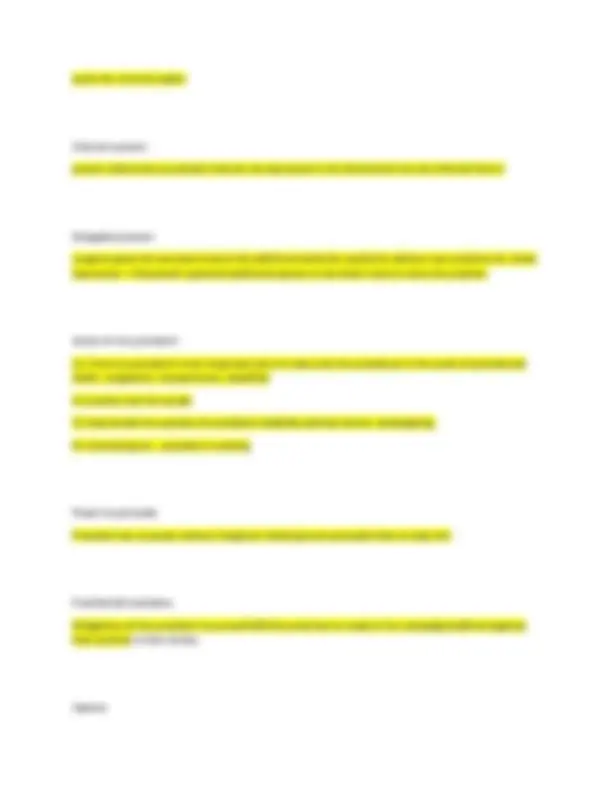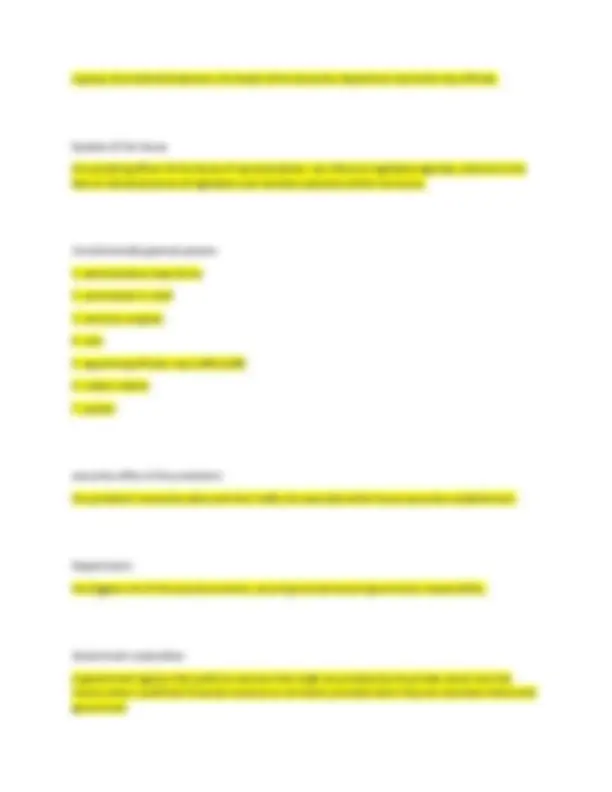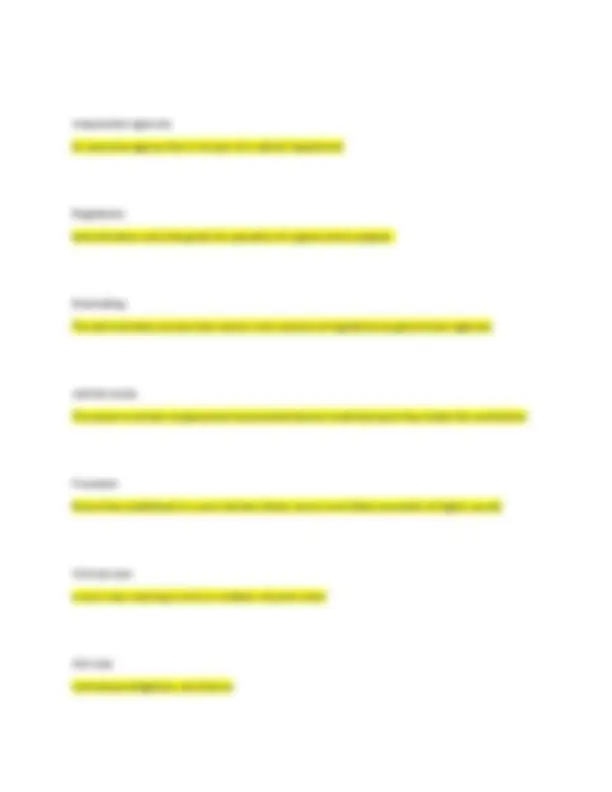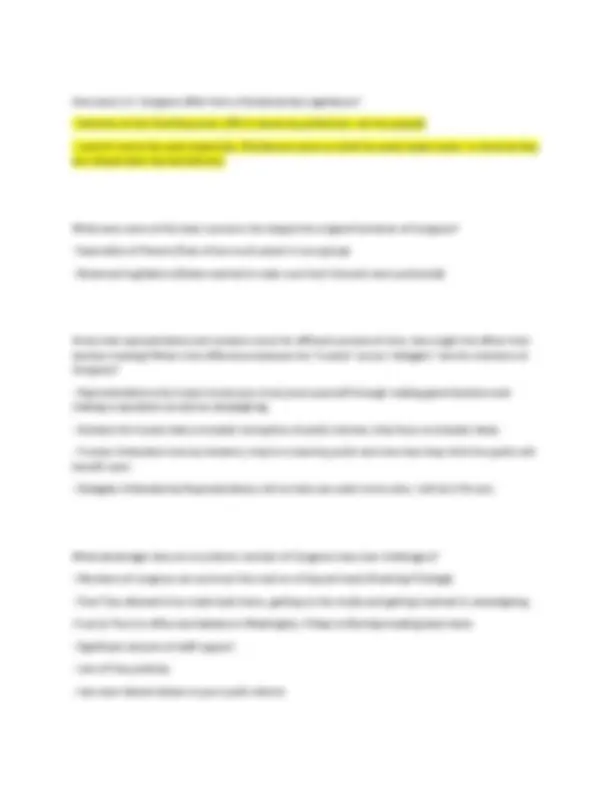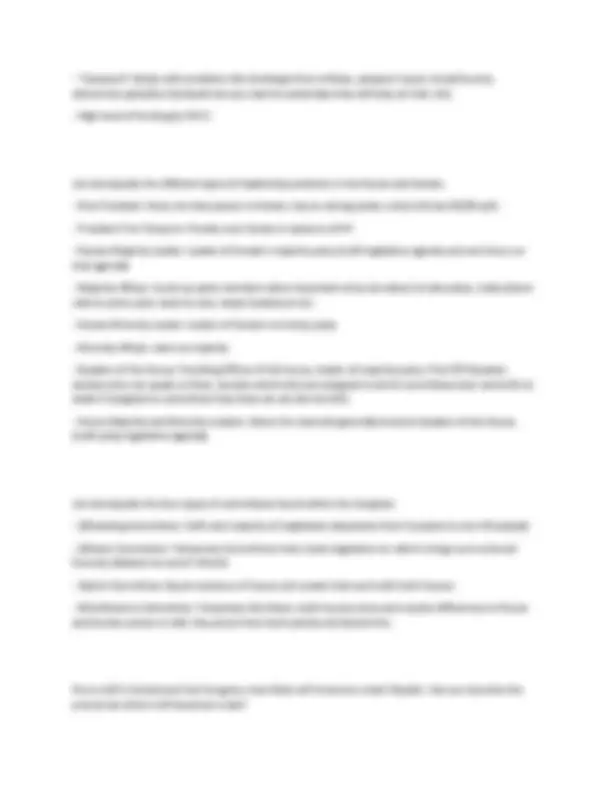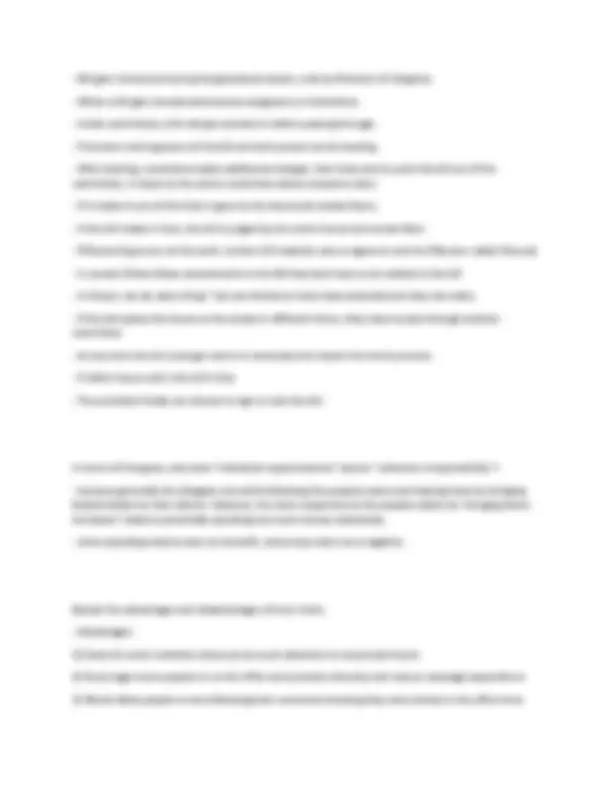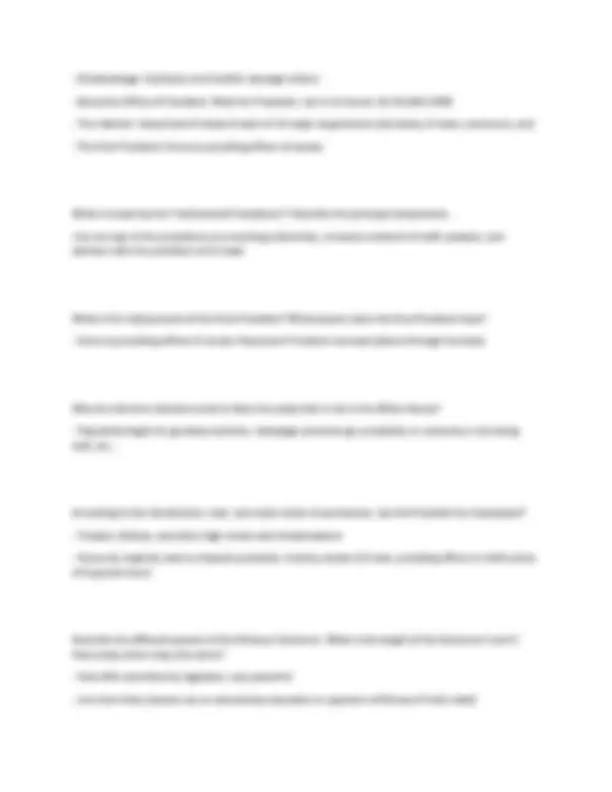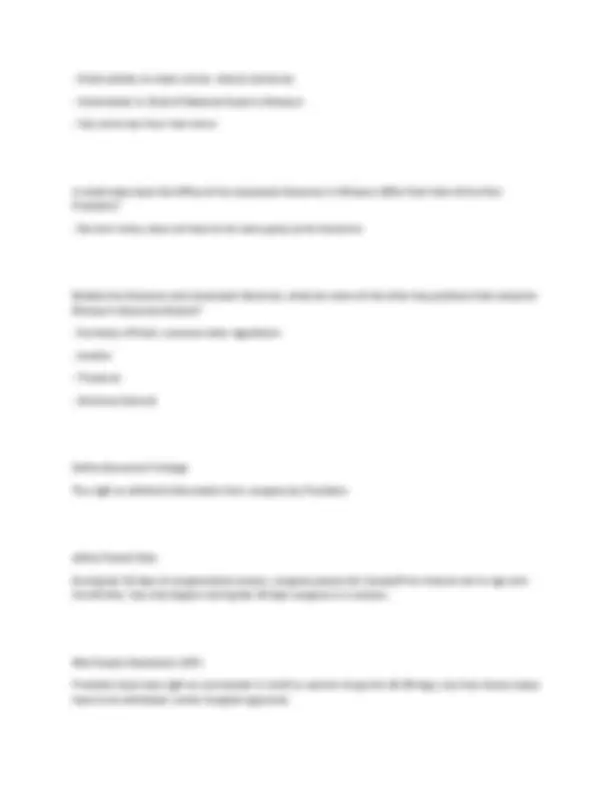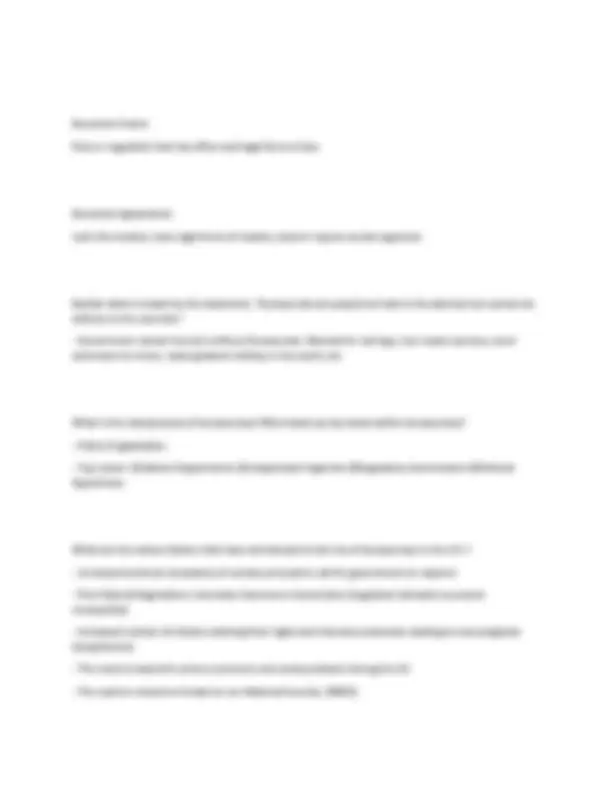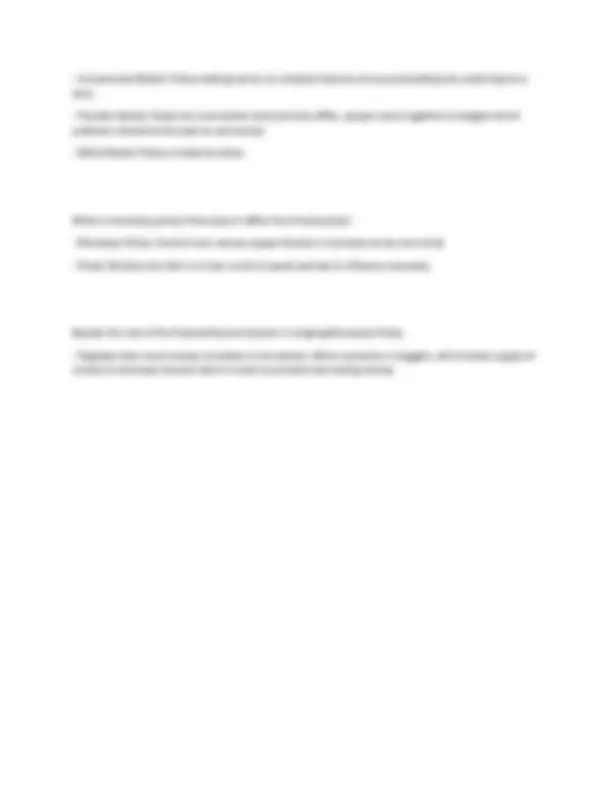Download Understanding the Structure and Roles of the U.S. Congress and more Exams Political Science in PDF only on Docsity!
PLS 101 EXAM 3 (100 out of 100) PLS 101
MSU Exam (Latest Update) Questions and
Verified Answers
Trustee are reps who listen to the opinions of the people they represent and then uses their best judgment to make the final vote. ( of what they think is best) Delegates are reps who vote the way their constituents would want them to, regardless of their own opinions. 6 Ways to Show Appreciation for Your Child's Teacher Standing Committee is a permanent committee that specializes in a particular legislative area Joint Committee a committee made up of members of both the House and the Senate Select Committee (TEMPORARY) a small legislative committee appointed for a special purpose. Conference Committee
(TEMPORARY) Both houses serve/resolve differences in bills made by each other. (key actors from both parties attend,) Filibuster A delaying tactic, used in the senate, that often involves continuously holding the floor to prevent action a piece of legislation. (to end a filibuster requires a cloture vote of three 3/5ths of the senate) Majority Leader the head of the majority party in the senate or house; the second-highest ranking member of the majority party. In the house, the majority party leader is the speaker of the house. Minority leader the head of the majority party in a legislative body, especially the US Senate or House of Representatives. President pro temp is elected by the majority party and is supposed to direct the senate in the vice president's absence Majority whip assist the majority leader Minority whip:
a group of presidential advisers; the heads of the executive department and other key officials. Speaker of the house the presiding officer of the house of representatives. can influence legislative agendas, determine the fate of individual pieces of legislation and members positions within the house. Constitutionally granted powers:
- administrative head of the
- commander in chief
- convene congress
- veto
- appointing officials- top 4,000-5,
- makes treaties
- pardon executive office of the presidents the president's executive aides and their staffs; the extended white house executive establishment. Departments the biggest unit of the executive branch, covering a broad area of government responsibility. Government corporation A government agency that performs services that might be provided by the private sector but that involve either insufficient financial incentive or are better provided when they are somehow linked with government
Independent agencies An executive agency that is not part of a cabinet department Regulations Administrative rules that guide the operation of a government program. Rulemaking The administration process that results in the issuance of regulations by government agencies Judicial review The power to declare congressional and presidential acts invalid because they violate the constitution Precedent Rule of law established in a court decision (lower courts must follow precedent of higher courts) Criminal case a court case involving a crime or violation of public order Civil case contractual obligations, and divorce
Amicus curiae brief A brief filed by a 3rd party, who is not involved in the litigation but who has interest in outcome Judgement The judicial decision in a court case. Dissent the disagreement of a judgment with a majority decision Civil liberties Freedoms guaranteed to people Four types of committees? SELECT STANDING JOINT CONFERENCE How does a bill become a law? Must be introduced to committee and approved Voted on by house or senate Signed by president
How does U.S. Congress differ from a Parliamentary Legislature?
- Selection of the Chief Executive. (PM is chosen by parliament, not the people)
- Level of control by party leadership. (Parliament votes on what the party leader wants. In America they are independant representatives.) What were some of the basic concerns the shaped the original formation of Congress?
- Seperation of Powers (Fear of too much power in one group)
- Bicameral Legislature (States wanted to make sure their interests were protected) Given that representatives and senators serve for different periods of time, how might this affect their decision making? What is the difference between the "trustee" versus "delegate" role for members of Congress?
- Representatives only 2 years means you must prove yourself through making good decisions and making a reputation as well as campaigning.
- Senators for 6 years have a broader conception of public interest, they focus on broader ideas.
- Trustee: Embodied more by Senators, they're trusted by public and vote how they think the public will benefit most.
- Delegate: Embodied by Representatives, tell me how you want me to vote, I will do it for you. What advantages does an incumbent member of Congress have over challengers?
- Members of congress can send out free mail on a frequent basis (Franking Privilege)
- Free Trips allowed to be made back home, getting on the media and getting involved in campaigning.
- Tues to Thurs in office and debates in Washington, Friday to Monday heading back home
- Significant amount of staff support
- Lots of free publicity
- Can steer federal dollars to your public district
- Bill gets introduced during Congressional session, only by Member of Congress.
- When a bill gets introduced becomes assigned to a Committee.
- Inside committees, bills will get worked on before passing through.
- Promoters and opposers of the bill are both present at the hearing.
- After hearing, committee makes additional changes, then they vote to push the bill out of the committee, it moves to the entire committee where everyone votes
- If it makes it out of this then it goes to the house and senate floors.
- If the bill makes it here, the bill is judged by the entire house and senate floor.
- Filibustering occurs at this point. (unless 3/5 majority vote to agree to end the filibuster called Closure)
- In senate: Riders:Allow amendments to the Bill that dont have to be related to the bill
- In House: can do same thing ^ but are limited on how many amendments they can make.
- If the bill passes the house or the senate in different forms, they have to pass through another committee.
- At any time the bill could get veto'd or amended and restart this entire process.
- If either house veto's the bill it dies
- The president finally can choose to sign or veto the bill. In terms of Congress, why does "individual responsiveness" lead to "collective irresponsibility"?
- because generally the delegate role while following the peoples wants and helping them by bringing federal dollars to their district. However, the more responsive to the peoples wants by "bringing home the bacon" leads to potentially spending too much money collectively.
- some spending may be seen as a benefit, some may view it as a negative Explain the advantages and disadvantages of term limits.
- Advantages:
- Senior & Junior members show just as much attention to issues back home
- Encourages more people to run for office and promote diversity and reduce campaign expenditure
- Would allow people to vote following their conciense knowing they were limited in the office time.
- Out of touch with the public.
- Without term limits, voters are denied choice (incumbency vs. challengers)
- Deprive voters opportunity to reelect good people
- Weakening congress of institutional knowledge and experience and strengthening other two powers.
- Amateurs will be coming in and learning the ropes.
- States WITH term limits would be at disadvantage than those WITHOUT term limits. (see #4&5) In what ways does the Missouri Legislature differ from the U.S. Congress?
- The General Assembly: 163 House 34 Senate
- Term Limits: House serve 2 years(same), but MO Senate only serves 4 years with 8 years total(diff).
- Missouri districts are re-drawn every Ten years.
- Any bill over $100,000 goes to a Budget Committee.
- MO Governor has power for Line Item Veto(Bill reaches governors desk, but Governor can choose parts to veto and pass the rest.) In class we discussed the growing importance of congressional staffs. Who are they and what do they do? How do they foster and inhibit democracy?
- Write letters on behalf of the Congress member. They relay letters coming in to the congress member. Also engage in Casework(helping with passports and social security)
- Congressional Research Service: Helps do research on legislation
- Government Accountability Office: Investigatve arm for congress. Weed out waste/fraud/abuse (ex: weapon systems approved that havent been tested appropriately)
- Congressional Budget Office: Helps to assist congress in analyses of presidents budget. Detailed projections of how economy will be and how the budget will effectively work or not. How does the selection of the President differ from the selection of the Chief Executive in a parliamentary form of democracy? What does this difference mean in terms of how policy gets made?
- Disadvantage: Confusion and Conflict amongst others.
- Executive Office of President: Work for President, not in his house. Ex:CIA,NSC,OMB
- The Cabinet: Comprised of heads of each of 15 major departments (secretary of state, commerce, etc)
- The Vice President: Serve as presiding officer of senate What is meant by the "Institutional Presidency"? Describe the principal components.
- the concept of the presidency as a working collectivity, a massive network of staff, analysts, and advisers with the president as its head What is the role/purpose of the Vice-President? What powers does the Vice-President have?
- Serve as presiding officer of senate. Represent President overseas (attend foreign funerals) Why do mid-term elections tend to favor the party that is not in the White House?
- Popularity begins to go away overtime. Campaign promises go unrealised, or economy is not doing well, etc... According to the Constitution, how, and under what circumstances, can the President be impeached?
- Treason, Bribery, and other high crimes and misdemeanors
- House by majority vote to impeach president, tried by senate 2/3 vote, presiding officer is chief justice of Supreme Court Describe the different powers of the Missouri Governor. What is the length of the Governor's term? How many terms may s/he serve?
- Veto Bills submitted by legislator, very powerful
- Line Item Veto (cannot use on elementary education or payment of Missouri Public debt)
- Grant pardon on state crimes, reduce sentences
- Commander in Chief of National Guard in Missouri
- Can serve two Four-Year terms In what ways does the Office of the Lieutenant Governor in Missouri differ from that of the Vice- President?
- No term limits, does not have to be same party as the Governor Besides the Governor and Lieutenant Governor, what are some of the other key positions that comprise Missouri's Executive Branch?
- Secretary of State: oversees state regulations
- Auditor
- Treasurer
- Attorney General Define Executive Privilege The right to withhold information from congress by President. define Pocket Veto During last 10 days of congressional session, congress passes bill, Senate/Pres chooses not to sign and the bill dies. Can only happen during last 10 days congress is in session. War Powers Resolution 1973 President does have right as commander in chief to commit troops for 60-90 days, but then those troops have to be withdrawn unless Congress approves.
Describe the different types of internal and external controls on bureaucracy.
- External Controls 1)Media: Watchdog 2)Freedom of Information Act: Request to see information to see what an agency did at a specific time. 3)Sunset Provisions: Create new program with 5 years of existance, deceases unless reinacted. 4)Sunshine Laws: Laws that say meetings must be conducted in public audiences.
- Internal Controls 1)Concept of Morality 2)Professional Training 3)Adhering to Constitution Why might a powerful bureaucracy be problematic for democracy? Why might it be beneficial?
- Fear that they serve their own interests.
- Principle/Agent Theory: Agent has more information than the principle, so the agent may engage in their own interest as opposed to the interest of the principle. Explain the concept of patronage versus merit. Do we have both patronage and merit at work in bureaucracy? Explain.
- Patronage: Who you know (political employees), Party and political loyalty
- Merit: Highered based off what you know and skills
- Yes. Jobs recieved due to who you know and to ensure political loyalty and agencies going in right direction. Merit is based off of skills to help agencies reach the goals set by patronage. Why is bureaucracy so powerful? What are some of the factors that allow bureaucracy to become and remain powerful?
- Administrative discretion, resources,technical expertise, and interest group support. Experts remain in Bureaucracy through tenure for a very long time. Currently, there are over 4,000 patronage appointments at the federal level. What is the justification behind these appointments?
- There to ensure each of the agencies will carry out the wishes of the president.
- Patronage are considered as Loyal members. What was the significance of the Pendleton Act of 1883? What factors prompted its passage?
- Merit system first began for federal employees. Couldn't be hired unless merit, fired by incompetence.
- Prompted its passage by 10% of federal jobs were covered under Merit. Define public policy, and describe the different stages of the policy process.
- Actions taken by government officials in response to problems and issues raised by political actors.
- Stages: 1)Issue Identification: People calling on Government to address an issue. 2)Agenda Setting: Issue reaches Agenda once it gets attention. 3)Policy Formulation Stage: Officials attempting to make a plan to fix an issue. 4)Policy Adoption Stage: Once it makes it through the formulation stage, it is adopted. 5)Policy Implementation Stage: Bureaucracy decides how to implement the policy, and could be very different from the original vision. 6)Policy Evaluation Stage: How well it worked, and how well was the return on investment What are the different models of policy making? How do they differ from each other?
- Rational Model: After identifying problems, information is gathered to find root causes to problems. Look at costs and benefits of several different approaches.

